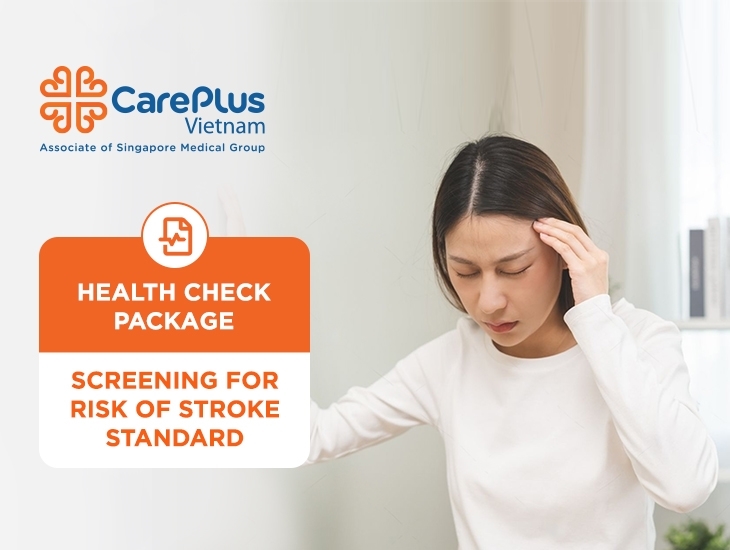Screening For Risk Of Stroke - Standard
Stroke is a dangerous disease that occurs suddenly with a high mortality rate if it's not detected early and treated promptly. Worryingly, stroke shows signs of getting younger, increasing sharply at the ages of 40-45 years old or even at 20 years old.

What is a stroke?
A stroke is a brain injury that occurs when the blood supply to the brain is interrupted or a blood vessel in the brain bursts. At that time, the amount of oxygen and nutrients that feed the brain cells is significantly reduced. Within minutes, brain cells begin to die and cause many life-threatening complications slowly.
The main types of stroke:
- Ischemic stroke: Caused by blockage of an artery in the brain which accounts for about 85% of strokes.
-
A stroke is caused by blood clots formed in place: caused by atherosclerotic plaque rupture in the artery, forming a blood clot that fills the artery.
-
Embolic stroke: Blood clots form elsewhere in the body, most commonly in the heart. It then travels to the brain, causing the blockage.
- Hemorrhagic stroke: This type of stroke is caused by the rupture of a blood vessel in the brain that causes bleeding, which can be caused by an aneurysm, a malformed cerebrovascular system. Hemorrhagic strokes account for about 15% of all strokes.
- Transient ischemic stroke (TIA): is often called mini-stroke/pre-stroke because these are short periods of stroke symptoms, but symptoms resolve on their own within 24 hours. TIAs increase the risk of an actual stroke if it's not detected and treated promptly.
Causes of stroke
There are many causes of stroke, of which 80% of strokes are caused by atherosclerosis. Factors such as high blood pressure, diabetes, obesity, physical inactivity, and smoking are strongly associated with the risk of atherosclerosis and stroke. In addition, people with cardiovascular diseases like Heart failure, atrial fibrillation, infective endocarditis, and rheumatic heart valve stenosis have a high risk of stroke.
For cerebral hemorrhage due to cerebrovascular malformation, if there is a history of polycystic kidney disease or at least 2 immediate relatives with cerebral hemorrhage due to cerebral vascular malformations are cases that need to be considered when screening.
Who needs stroke screening?
Routine stroke risk screening is necessary if you have any of the following:
- Family history of a loved one having a stroke
- People with diabetes
- People with high blood pressure
- High cholesterol
- People with heart disease
- Smoke, …
With a team of experienced doctors and radiologists, customers are examined for possible risks of ischemic, hemorrhagic, and transient ischemic stroke. The goal is to find the hidden threats of recurrence (for people who have had a stroke). So they can be monitored and treated that minimize the possibility of a stroke as soon as possible.
About 80% of strokes are preventable. Take the initiative to check your health today with doctors and prevent the risk of stroke at the earliest.
STROKE PACKAGE:
|
|
2. IMAGING
|
|
3. TESTS
4. FUNCTIONAL ASSESSSMENT
|
- Please do not take any medications you are using (diabetic medications, insulin…) on the morning of your blood test. Regular high blood pressure medication can be continued.
- Please drink plain water and be fasten from urinating during the abdominal ultrasound for accurate results.
- Please wear clothing without metal buttons; or do not wear metal jewelry during the X-ray and the electrocardiograms to avoid confusion, insertion of images, and electrocardiogram interference.
- Please bring along any Past Medical Records (e.g. doctor's memo/X-ray films/ECG/medical report/ prescription/vaccination).
- Please bring along your Insurance Card (if any).
- Please bring along your Gift Vouchers/Gift Cards/eVouchers from CarePlus (if any).